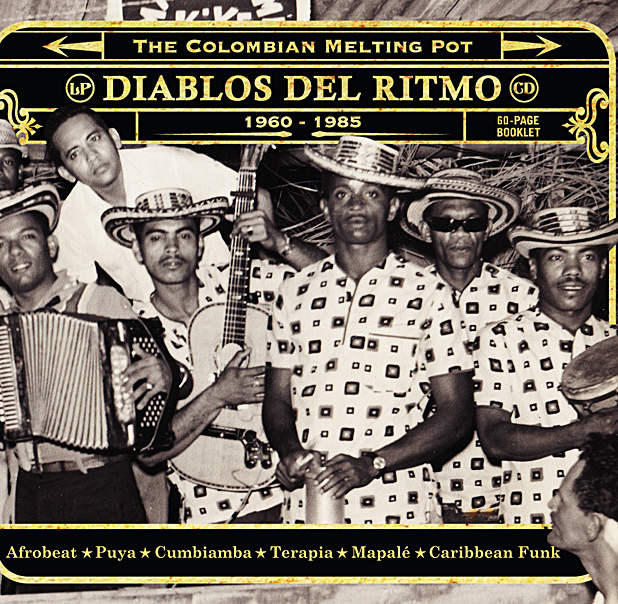On the northern tip of Colombia’s Caribbean facing coastline lies the polygenesis voracious port of Barranquilla, a magnet and “Mecca” for seafarers and traders from across the globe. Bringing their goods and barter, these various visitors also shared their music and culture. It’s uncertain when the African sound first wowed the Colombian town, but its seismic impact upon the South American Latin-dominated horizon is beyond doubt.
As ever the exhaustive complier, researcher, musical aficionado and pioneering erudite Samy Ben Redjeb, through his critically exhorted label Analog Africa, serves-up a hearty panoramic purview; bringing to life a much forgotten epoch in the annals of musical development. No one quite sums up, or interacts like Samy, his insightful imprint doesn’t just take from its source but forms a long-standing beneficial relationship with the artists: Whether it’s setting-up a royalty and license deal with that original artist/band, or in this case exchanging his own prized and rare collection of African records for those featured on this compilation – in turn these nuggets have been used to compete in the famous local carnival’s sound system rivalries.
Perfectly encased within the usual beatific designed artwork (which in my opinion always looks and sounds better on vinyl), ‘Diablos Del Ritmo’ is a warm perspicacious travail through twenty-five years of omnivorous-fuelled enjoyment; and an alacrity congruous enjoyment at that, as the tropical native styles of Colombia rub-up against Afrobeat and Highlife to produce a unique dance hybrid. Into this, already, simmering pot of rhythms you can throw some Cuban and Caribbean influences, just to add a bit more allure and swinging salacious Latin sway to the mix.
Perhaps it shouldn’t be such a surprise that this cross-continental pollination occurred, as Colombia is home to the second biggest black population in the “Hispanic world” (Brazil having the largest), a residue of the slave trade.
An atmosphere and mood is set from the off, as the sultry gyrating Wganda Kenya opener ‘El Caterete’ promises good times. From the on in the split album unleashes one pliable concatenate track after another. The first part runs through a full gamut of, “Afrobeat, Palenque Sounds, Tropical Funk and Terapia” infectious grooves, bouncing between the unbridled shrill excited thump of Myrian Makenwas’ ‘Amampondo’, and the party funk pop of Fuentes All Stars’ conga fever anthem ‘Pégale a La Nalga’.
Throughout this survey the listener is surprisingly piqued by the lingering resonance of French colonized North Africa – especially on the snake-charmer, accordion squeezed ‘Lumbalu’ by Calixto Ochoa y Los Papaupas – and Moorish Spain – cue the throaty Arabian vocal shimmy, ‘Quiero Mi Gente’ by Abelardo Carbono.
Just as rousing and upbeat, part two digests the Colombian exotic sounds of, “Puya, Porro, Gaita, Cumbiamba, Mapalé and Chandé.” Preaching the joyous gospel of Latin dance, all of these sauntering tunes play with the principle rhythms and sway of calypso, salsa and, to some degree, mambo. Generous as ever, the Colombian’s marry an ever-widening catchment area of influences to these core building blocks. So you have the tribal shakedown and atavistic crying horn howls of Sonora Dinamita’s ‘Eco en Stereo’, sitting comfortably with the New Orleans, via the bazars of Cairo, jazzy licks of J. Alvear’s ‘Cumbia Sincelejana’.
Evoking a litany of worldwide landscapes, you can sometimes be mistaken for thinking that Juan Piña Y su Muchachos’ ‘La Nena’ has just transported you to Casablanca, whilst constantly under the impression that you may have strayed into the Nigerian delta, or onto the Ivory Coast with many of the songs on this LP.
Twelve albums in and the Analog Africa seal of quality remains unshaken: If anything this latest volume increases its reverent status. With a near-perfect oeuvre of choice records – whittled down from a thousand – there’s scant evidence of fillers, with no obvious weak links to the 32-track collection. An unintentional result of the “Colombian melting pot” is how it shows that the diverse crossbreeding and mixing of musical genres and styles has been going on, merrily, since the year nought.
Released 12th November 2012
[Rating:4]
http://analogafrica.blogspot.co.uk




